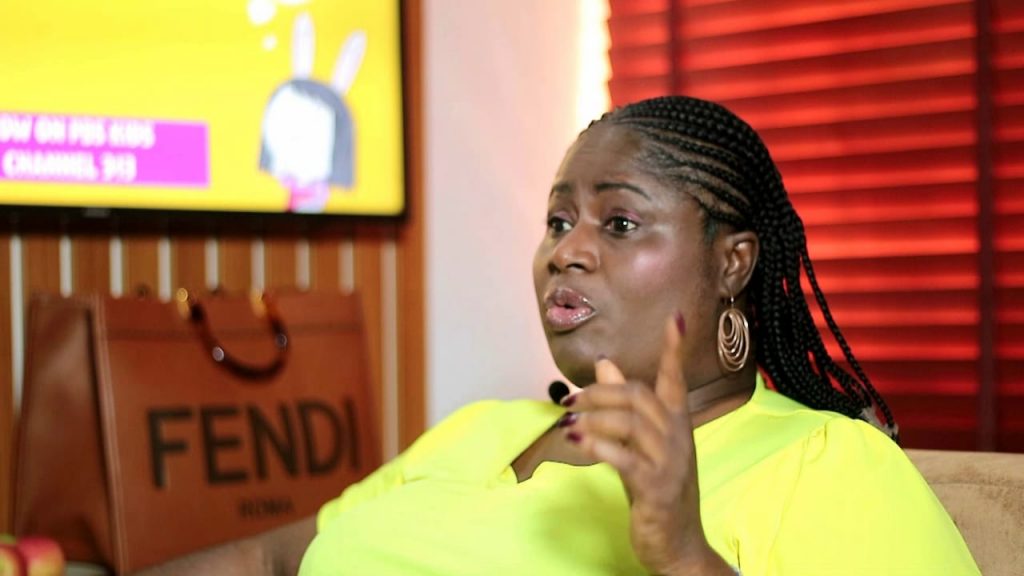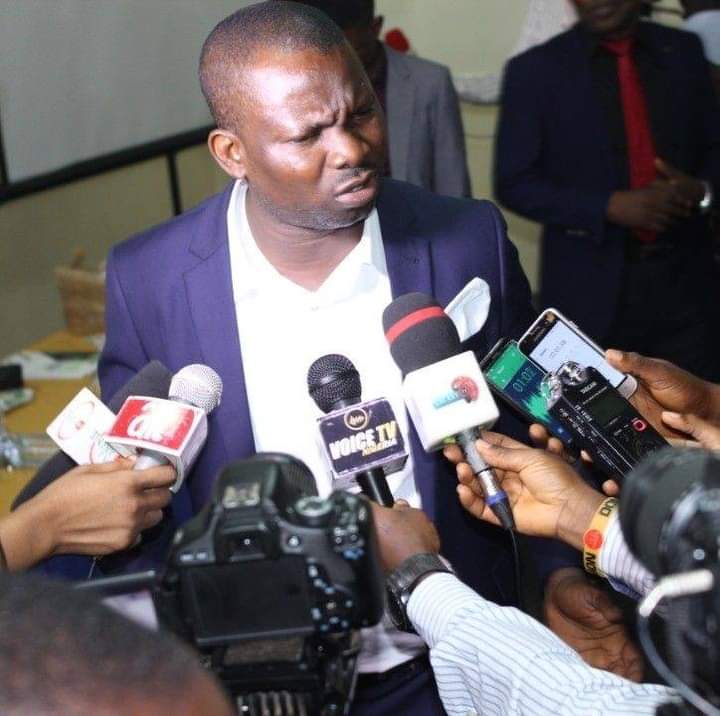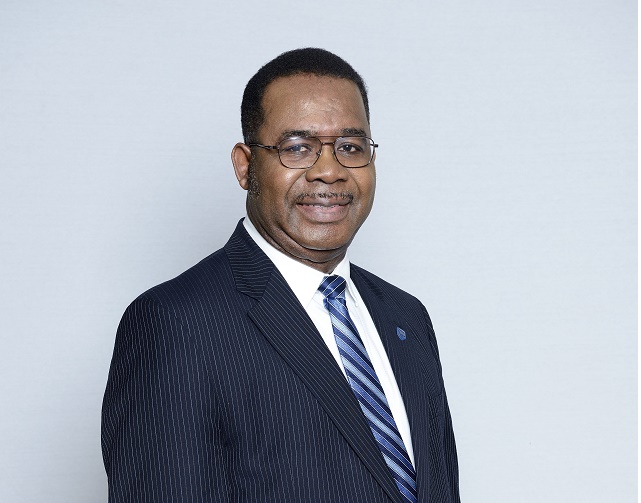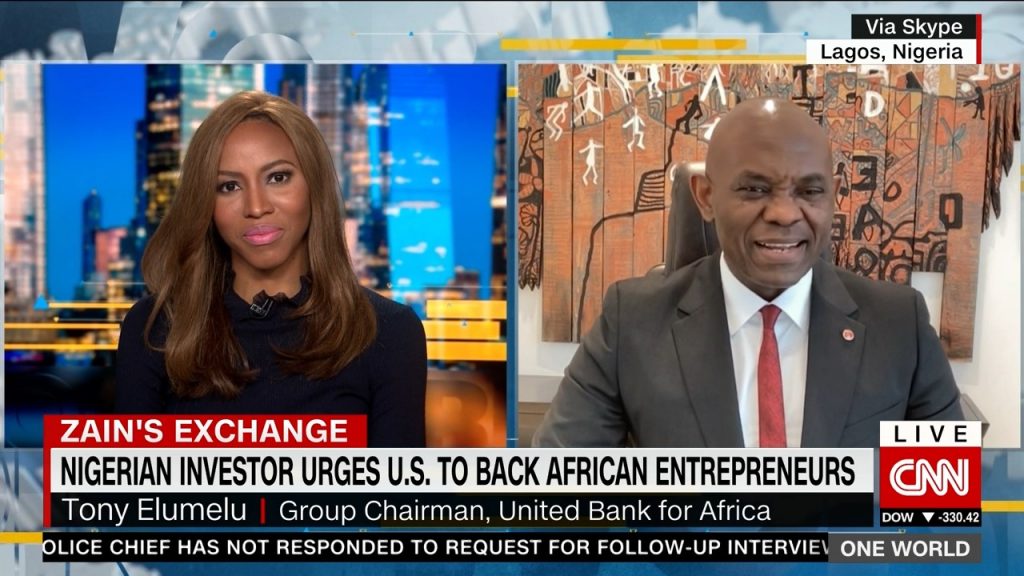Interviews
Developing Economies Need a Fair Energy Transition Strategy – Chairman, Stanbic IBTC
Published
2 years agoon
AJAGBE ADEYEMI TESLIM
Sponsored BY: H&H
Exclusive Interview with Stanbic IBTC Chairman, Mr. Basil Omiyi where he gave Justice to many Questions and sundry
The financial industry has played a vital role in the global economic recovery since the novel COVID-19 adverse impact in 2020. The Nigerian financial sector, particularly the banking industry, has been exceptionally responsive to the challenges in the domestic environment. The resilience of the Nigerian financial sector is undoubtedly reassuring, and the Central Bank of Nigeria has been supportive in various aspects. However, due to the fragile economy, high inflation rate, Naira devaluation, and an intensely competitive business environment, the financial sector grapples with harsh macroeconomic conditions.
2. Environmental, Social and Governance (ESG) have become of increasing interest among companies in the last couple of years. How is Stanbic IBTC promoting and adopting this concept?
At Stanbic IBTC, we are well onboard the ESG paradigm. We recognise that our core business activities must support and contribute to inclusive and sustainable economic growth. We have thus adopted SEE (Social, Environmental and Economic) Impacts as one of our strategic value drivers. The SEE value driver requires us to think differently about the broader ESG impacts of our business activities, both direct and indirect impacts.
In operationalising the SEE value driver, we seek to identify and explore opportunities to provide financial solutions, products, and services that help address social, economic, and environmental challenges. This also requires that we work with our clients, service providers, and other stakeholders to promote positive SEE outcomes while minimising negative SEE impacts.
3. There have been various calls for the adoption of green energy, especially among corporate organisations. Recently, Stanbic IBTC held its Sustainability Week, where the need for zero-emission was discussed. How important is green energy to sustainability development in Nigeria, and what can other corporates, for example, major financial institutions do to drive this principle?
For development in Nigeria to be sustainable, there must be an appropriate balance to ensure the environment and society are not negatively affected by economic activities, both today and in the future. We acknowledge that the economy and society are wholly owned subsidiaries of the environment; hence we must strive to ensure that the environment remains stable to support economic and social activities.
Green energy (Solar, Wind, Hydro etc.) thus presents an opportunity to pursue economic development while ensuring minimal adverse impacts on the environment. Green energy is devoid of carbon emissions (unlike fossil fuel energy sources) which harms the environment and is one of the major contributors to climate change. Corporates, including financial institutions, can gradually shift to cleaner energy sources for their operations. Also, financial institutions can help advance this shift by facilitating funding (in line with their risk appetites), which will be necessary to achieve growth in the green energy space.
However, the journey to a green energy world has only just begun. As you saw at COP26 (Conference of Parties 26), the world is attempting to obtain the commitment of Nation States to the Net-zero emission world. Progress is being made, but it is slow, and there are contentious positions. At this stage, most developing economies do not have the technology for green energy. Neither can they afford the cost of green energy if they are to continue providing for their people and societies and improving their standard of living. The developed world, which is disproportionally responsible, on both gross and per capita basis, for the bulk of carbon emission into the atmosphere, is unwilling to drastically cut their energy consumption, as they wish to maintain the standard of living of their people. Therefore, there is a need for a just energy transition strategy that is fair to all and affordable to all.
4. How has your organisation been able to reduce its carbon footprint, especially in the banking halls and areas where staff members interface with customers?
Building Environmental Resilience is one of our four Sustainability pillars in Stanbic IBTC. This pillar demonstrates our focus on environmental footprint management. In line with this, we have implemented and continued to expand on programs to reduce our carbon footprints. The key areas include:
– Reduction of energy consumption in our office locations using energy-efficient fittings; retrofitting our office locations to maximise cooling and reduce energy wastage; the Switch-off and Unplug (SOUP) initiative after working hours.
– Adoption of cleaner energy sources across our office locations. We installed solar energy solutions across over one-fourth of our branch locations. In addition, we have adopted the use of natural gas (which is cleaner than diesel and petrol) for our energy consumption at our Idejo and Walter Carrington Crescent head office campuses.
– We also have the Go-Green program across some branch locations to reduce energy and paper consumption and improve water efficiency.
Besides reducing our carbon generation, we have recently also adopted Tree Planting programs to help us with carbon sequestration. So far, we have facilitated the planting of over 300 trees, and this number will grow significantly in the coming years.
5. What measures has Stanbic IBTC as a group taken to combat climate change?
We acknowledge the need for urgency in halting climate change, and Stanbic IBTC is contributing its quota to addressing this issue. In addition to the programs discussed earlier (aimed at reducing carbon footprints from our operations), we are also working with vendors and customers to provide solutions that can help address climate change issues. This is reflected in one of our seven focus SEE Impact Areas – Climate Change and Sustainable Finance – where the Group seeks to provide financial solutions to support climate change mitigation and adaptation measures.
We also continue to advance awareness around climate change amongst the general public; leveraging our social media platforms and webinars, for instance, the recently concluded Net Zero Webinar. Similarly, our parent company, the Standard Bank Group hosted a Climate Summit in partnership with University of London’s School of Oriental and African Studies. We continue to take awareness communication initiatives by sharing practical tips that people can adopt to help address climate change.
6. We know that marketing and advertising is very necessary to any business – yours inclusive. What plans are in place to adopt sustainable advertising models which help the environment and move away from traditional advertising?
As an organisation, we have begun practicing sustainability marketing. One of the ways we have done this is drastically reducing our investment in traditional print media advertising and up-weighting investment in digital advertising. We have also instituted Sustainability Saturdays, where we educate the general populace across digital platforms on all issues about sustainability, highlighting what we, as a company, have invested in socially and our environmental impacts in the areas we operate. These are embedded in our marketing strategy. Another way we practice sustainable advertising is by ensuring that our marketing is consumer-oriented. Our engagements with our customers are innovatively value-adding to the customers. Lastly, our solutions, products, and services are useful to all strata of society.
7. How well will you say Nigerian businesses and corporate organisations are doing in terms of protecting the environment?
I would say there is growing awareness amongst Nigerian businesses on the need to protect the environment. Some organisations are genuinely adopting measures to manage their environmental footprints in line with their commitments and or regulatory requirements.
However, we are barely scratching the surface as a lot of work still needs to be done to develop appropriate regulations and enforce existing regulations to ensure compliance with environmental best practices and standards. Also, a lot still needs to be done in collaboration amongst stakeholders (regulators, NGOs, corporates, communities) to advance environmental protection in Nigeria.
8. In your opinion, how has the pandemic affected the adoption of sustainable environmental practices?
The COVID-19 pandemic presented a potent reminder of the need for businesses to adopt sustainable practices that can help minimise disruptions to business arising from such black-swan events. It was interesting to note how organisations quickly adopted sustainable environmental practices such as using digital conferencing systems and reducing business travel, which is a key contributor to global emissions. Therefore, in my opinion, the pandemic accelerated the adoption of sustainable environmental practices.
9. As a company that is big on CSI projects, how do you contribute in ensuring your host communities benefit from sustainable environmental practices?
As a socially responsible organisation, we develop initiatives to impact the communities in which we operate. Over the years, we have donated several water borehole projects to our host communities as part of our role in improving the standard of living of these communities. Access to clean water is part of the United Nations Sustainable Development Goals and we deliberately chose solar energy to power these water sources. Being an SDG-oriented organisation, another reason we have opted for the high quality solar powered borehole machines is to reduce the impact of fossil fuels on the environment.
We also have embarked on tree planting activities as part of our CSI initiatives; which we have been able to sustain due to our partnership with the Nigerian Conservation Foundation (NCF). As part of our 30th anniversary activities in 2019, we planted 30 trees at Lekki Conservation Centre (LCC), an urban jungle in the heart of Lagos. We further planted 30 trees in each of the six geopolitical zones of the country. We have also encouraged staff to participate in tree planting activities through their departmental CSI initiatives. This is one of the practical methods we have taken towards reducing carbon footprints and achieving net zero emissions.
10. What can be done differently in the financial sector in Nigeria to ensure more people begin to pay attention to issues that affect the planet?
I believe that the societal influence of the financial sector in driving positive changes has not been fully harnessed. On one hand, the public perception of the financial sector needs to be improved such that it claims its rightful place in society and get the public assured that it functions for the greater benefit of the society. The industry is expected to lead by example by continuously improving sustainability drives in their business operations, for instance, Stanbic IBTC Group has committed to and is working towards achieving net-zero emissions by 2050.
On the other hand, the financial sector is responsible for adopting measures that will influence its various stakeholders such as providing them with sustainable investing opportunities and prioritising compliant stakeholders.
There is a need for collaboration amongst stakeholders (government agencies, regulators, environmental experts, financial institutions, NGOs, Communities) towards developing an ecosystem for environmental financing. This will encourage and facilitate increased adoption of environmentally beneficial practices, solutions, or programs.
11. What is your expectation for the industry as a whole in the near future?
Without mincing words, ‘innovation-driven change’. Technology is rapidly advancing, competition is getting stiffer, and the regulatory environment is changing. The industry is generally looking out for improved ways to grow scale and remain relevant in society. The potentials for innovations to transform the financial ecosystem are almost limitless, and these courses are still being charted.
You may like
Interviews
I want to make sure that no one is hungry in the World, Pastor Tinuola Babafemi
Published
2 years agoon
July 3, 2022August24news
Sponsored by: H&H
One of the major non-government organizations making efforts to tackle the menace of hunger across the world is the House of Praise and Prayer ministry, HOPAP, a Canada-based charity organization founded by Pastor Tinuola Babafemi, a Nigerian.
Pastor Tinuola whose NGO had affected many Lives in Canada by providing free food banks to the thousands of less- less privileged in Ontario, Canada, has, however, deemed it fits to extend the same nature of service to the humanity through her NGO to Nigeria by intending to feed over 5000 Nigerians daily.
Recent 2022 statistics from the United Nations Food and Agriculture Organization, FAO, indicates that 811 million people still go to bed hungry each night.
The report said that after steadily declining for a decade, world hunger is on the rise, affecting 9.9 percent of people globally.
From 2019 to 2020, the number of undernourished people grew by as many as 161 million, a crisis is driven even largely by conflict, climate change, and the COVID-19 pandemic.
In the case of Nigeria, the state of insecurity among other factors are responsible for the rate of hunger in the land.
On this regard, FAO has emphasised the need for bold action against hunger before things get out of hand. According to them, about 660 million people may still face hunger in 2030 due to the lasting effects of the COVID-19 pandemic on global security.

Pastor, Tinuola
“Unless bold actions are taken to accelerate progress, especially actions to address major drivers of food insecurity and malnutrition and the inequalities affecting the access of millions to food, hunger will not be eradicated by 2030”.
In a bid to put an end to hunger in the world, a humanitarian, an Entrepreneur, and a crusader of Christ, Pastor Tinuola Babafemi through her NGO, House of Praise and Prayer, (HOPAP ) is on her mission to end hunger with her project, ‘PROJECT FEED 5000’ which is centered at reaching out to as many as possible especially the less privilege with her food bank, making sure that no household goes hungry
With this moves, HOPAP, is on it’s way of supporting the UN’s Sustainable Development Goals, goal three of Zero Hunger.
Tinuola tells the story of how she struggled to survive outside Nigeria, why she started HOPAP, and the impacts she has made and her plans towards the future with Sesan Awobiye
Your background and how it has influenced your project?
I was brought up in a Christian home. My father was an elder of The Apostolic Church. My mother was a deaconess.
They were very devoted in their religion. My parents loved Christ and they brought us up in the same manner. I particularly followed their footsteps. I loved to go to church, anything of God, anything of Christian religion. That is where the interest of having a House of Praise and Prayer, HOPAP came from. It is the background I was born into.
My name is Tinuola Babafemi. I am a Nigerian /Canadian. My parents are from Ilesha, but we grew up in Ibadan. I did most of my secondary school and some part of my education in some parts of Ibadan, before I moved on to Canada.
I have an NGO called House of Praise and Prayer, (HOPAP). We started this Charitable Ministry on the 15th of December 2015 and this year by the grace of God we will be celebrating our 7th anniversary.
We are Ontario corporation and working across Ontario, Canada.
There shouldn’t be
HOPAP Charity Organisation is aimed at eradicating hunger in the world by 2032. “Their shouldn’t be anybody hungry in the world by 2032”
Why did you choose to come to Nigeria?
Ontario, Canada was our first point of call and we are going all over Ontario, and now we are coming to Nigeria in October, and that is why I am here in preparation for that. Because obviously, I am a Nigerian, a proud Nigerian, I love my country, we are more hungry in Nigeria than in Canada, you understand what I mean. Here in Canada, there are social services, and there is government support.
In the past, I have been homeless, I have been hungry, and I went to food bank, they gave me groceries, I had nowhere to cook and I had to give them out, so from that experience, I know that people are hungry, but they had nowhere to cook whatever you give them. So for those people, you should give them cooked food and not uncooked food. So when people come to register we will find out their situation so we know how to deal with them accordingly.
Would you say that It was your experience that prompted you to open this organization?
Yes. Because I have decided that If God can take me through that pain, I don’t want anybody to be hungry.
Can you tell us more about your experiences?
When we migrated to Canada, I was with my children. I have two children. It was very difficult for me to keep a job. I don’t know what went wrong, so If I couldn’t keep a job, I can’t earn a living and from there I was broke I resorted to going to a food bank to get food and most of the time they don’t have cooked meals. They don’t have facilities and they gave me what they had. They gave me groceries and there was nowhere to cook the groceries, so I decided that it is also good to have a kitchen and a pantry. We are going to have both.
How did you come out of the painful experience?
Yes, I decided to get a loan and set up my own business. When I set up my own business, as you know it takes few years or a few months, depending on how aggressive or the experience I have in the business to survive.
I lived in my grocery store for six months. I got a place for my two children where they lived together. my daughter was in the university, she was living in the university facility so I moved my son to stay with her. I was living in my grocery store. I chose my business over my accommodation because I was determined not to be hungry and to beg anybody again.
I created my own business and I lived inside my grocery store. I went to register with a local gym in the morning I would go to the gym, take my showers, and just use their equipment for two minutes. I would do my make-up and stay in the front of my businesses selling my products, and it worked, so that was how I came out of the situation.
After Ibadan where do you intend to go?
We are starting in Ibadan because I grew up in Ibadan
Our first point of call is Ibadan, because I am from Ibadan, and I have local contacts in Ibadan. It is a good point to start. I have friends, I have families that can support, to put me through what I needed to do. So Ibadan is a good place to start, I mean Oyo State, then we go to Lagos State.
Like how many people do you plan to reach out to?
As many people that need the help. It is not one person’s job. It is not my own job alone together we can end hunger in Nigeria.
So when you start it and people see how effective it is people will support you it is normal. I started it alone. My ministry started alone in Canada and one morning, I discovered that we were running out of food, I sent out ministry support letter to every contacts on my e-mail and my letter got to a particular man that I didn’t even know and I think he had a friend in the government so he sent the letter to the local government and later I got an email that reads: “Pastor Tinuola Babafemi, we heard about your project, ‘PROJECT FEED 5000’ we are curious about it, how can we help you, how can we partner with you, we have read and heard a lot about you? That was how the government started giving out grant support.
We serve over 100,000 families in year 2021
So when you start and people see your commitment and you are really doing what you say you want to do and you are making impact. It becomes everybody’s work, that is what I believe.
How much has HOPAP
impacted the society so far?
So far,we have impacted the society positively,because we put smiles on peoples’ faces.
When people walk into our food bank,they feel happy and surprised especially when they realise we are Nigeria.it really makes me feel fulfilled when i see people of different race and ideology benefiting from our food bank
You have a book?
Yes..
My book tells testimony of what God did for me
I put them together in a book to tell the world what I have been through and how God saw me through and how much God has been kind to me.
What Niche do you want to create in the society?
I want to make sure that nobody is hungry in Nigeria. Do you know the meaning of hunger? For people to be hungry? Do you know how bad hunger is, for people not to have something to eat for breakfast, lunch and dinner?
I want to make sure nobody is hungry again in Nigeria. That is my dream and it will come to pass.
Amen.
Listening to your live experiences, one will say that you were able to come out of it because you were residing in Abroad, and life abroad as many thinks it’s better and easier, can you please, tell us how it was and how you think young people here in Nigeria can come out of such situation?
That is the mistake most people make. There is nowhere that is fair. Life over there is not even fair. It’s determination. There are people with Canadian passports that are hungry, with British passports that are hungry, that are poor. Being a British, being a foreigner, or being a Canadian doesn’t make you rich, it doesn’t make you make it in life. So it is individual’s determination. There are hungry people in Canada, if there were no hungry people there will be nothing like food bank. The difference is that there is help, there is somewhere to run to. So when you are in a difficult situation where everything is bad be determined. Don’t give up. The first thing is don’t give up. When you give up, you cannot plan, you cannot think of the next thing.
No matter how bad it is you can still come out. Things were very difficult, I was losing my job, I decided to set up a business, I didn’t have money, I took up a loan, you said Canada is easier than Nigerian, I actually got my loan from Nigeria. In Canada they would tell you, you have no credit history, you don’t have this, you don’t have that, it is very difficult, I had to get loan from family and friends, the loan was from Nigeria. Part of the groceries I started with, a friend shipped it into Canada. Food groceries like garri, beans and so on, from Nigeria. So it is determination. Whenever you are in trouble everything down, you have to remember that being broke is not the end, you have to see yourself getting up again, and you have to keep moving, that is my own belief.
At this stage of your life, would you say that you have found fulfillment?
Yes, I am very happy with what I am doing, I believe I am fulfilled.
How do your children see you, please?
Sometimes, your children don’t say much about you until the opportunity presents itself. Few days ago, I was celebrating my 50th birthday and they invited my children to give testimonies about what they know about me, or what they feel about me. Wow! it was mind-blowing what they said and I felt so happy. My son was very proud of my achievements. I didn’t know that they were observing that when I say something, I would do it, so they have positive testimonies to give. My daughter said there was no mother that could have brought her up, because she believes I am understanding, they said all sorts of nice things, so they have good testimonies to give.
What are your plans of achievement?
To see to the end of hunger in Nigeria. To make sure that nobody goes hungry.
You said earlier that you reside in Canada even during your hard times, why did you leave Nigeria to Canada?
Migration. We migrated for better education for my children.
How much support are you enjoying from the Canada government to have gained grounds?
Without any support from the government there is no programme that can survive. Yes, individuals may help, but government carries most of the responsibilities, but before government supports your vision, they have to see what you are doing. The same thing happens in Canada. Like I said earlier, we first started as a ministry, and when we ran out of resources, we wrote ministry support letters, we were lucky enough to see one person, out of the letters we sent out, to help us get the letter to the right place, and they reached us by themselves because they saw the difference we are making in the community. So I believe it is the same in Nigeria when they see what you are doing and you reach out, they will support you. It will not be just individuals supporting you.
You cannot compare Canada with Nigeria in terms of getting this support, have you considered some of the stress you may have to undergo in Nigeria to get support?
I won’t go through any stress. The Nigerian government is very sensible. They are educated they know what they are doing when they see something that works, they will support. the people they are trying to work with are not making it work, when they see tea am of people that are making it work, they will be happy to team up with them. I am positive, I have no problem. When we reach out to them they will support us.
How?
We will reach out to them, they will see what we are doing, they will be convinced and they will support us. I will remind you when we get to the stage. Every government want good things for their country but when we are not getting the right and adequate personnel, it will not work. When they see people doing things that have to be done and they are doing it in the right way, they will support.
What would you say about Nigerian youths?
I love the youths in Nigeria. They are very strong, because when we were growing up, it wasn’t as tough as this. And these things keep happening and Nigerians youths still have joyful disposition, they make use of every opportunity to make themselves happy regardless of what is going on. I believe in them, I believe with a little help most Nigerian youths will do better.
What project will you have for them?
When you have a charity organization you will focus on a particular theme, our own NGO is to end hunger, so if any youth is hungry, it still covers them. They still come to have their lunch, dinner, we are still doing something for them. Food is number one. when they have enough food, they can think right and think of what to do next. You cannot promise accommodation, jobs, you have to focus on one thing when youths are not hungry there will be less trouble in the community, they are happier, they can think well and they can plan well, I think it is the foundation. We give them the foundation.
Please, what is your message for the youths at this hard times as a mother?
They should stay away from trouble and not to give up. To believe in themselves. Being broke is not being poor and there has to be a breakdown before a breakthrough. Sometimes, when you go down, it means you are still coming up.
Aside from this project, what else do you do?
I want to continue to expand my ministry. I am an evangelical pastor. I like to preach the gospels, I like to travel to different countries for ministry works. That is what I love doing and I will keep doing that.
How long have you been in this Ministry?
It is going to be seven years now.
What is the experience like?
Very interesting. It’s been very interesting.
Having a Ministry was not my plan. God knows the full. Our plan is to bring out the food aspect of the Ministry. My mission of coming to Nigeria with my ministry is to support my people.
We have seen kindhearted Nigerians trying to reach out like this but because it is not channeled to the right people, it does not get to people that needs them instead, the people they gave the project to either pocket them, or reach out to minimal number of people, how do you tend to bridge that gap of corruption?
Thank you that’s a very good question.
During COVID-19, I was watching on the social media. I saw some of items that was meant to give to people in the communities that got expired in the warehouse.
And I was like, wow! If they had given them to their families I would have been happy but then, the didn’t give to their families and yet they didn’t give to the people it was meant for.
That is why I came on ground. I am going to arrange my team myself.
I will come with my team from Canada to supervise and train some of Nigeria they will be in charge of every unit.
I am going to bring my trusted team from Canada to Nigeria. I am not going to rely on or partner with just anybody that I don’t trust.
It’s going to be my team and I. Then we can entrust reliable personnel as we go along.
Considering the present situation in Nigeria. The economy, insecurity, and others, what can you tell us as a pastor, evangelist, and humanitarian?
We have to keep praying. I know we pray a lot in Nigeria, and that is what is sustaining us. We have to keep praying and hold on to our faith and we have to change from evil ways. The Bible says if my people that are called by my name can humble themselves, and be sober and pray to God. He will heal our land. I believe that one day things will change them country.
Do you have other projects or businesses you do that you will like us to hear about, please?
Yes, please.
Okay, please, let’s hear them.
I am the owner and operator of two locations of Mummy Afro Caribbean Kitchen both in Mississauga and Etobicoke, Ontario Canada. They are 5 Star Restaurant.
What is your slogan
Together we can end hunger in Nigeria.
Tell us about your most exciting moment or moments?
When I celebrated my 50th birthday recently. It was very exciting. I had photo shoots for two days. I changed over and over and over again. I ordered a few more attires, but they didn’t come on time I couldn’t use it. Maybe God saying that don’t I have to do, you have dressed enough, you have changed enough. I like occasions that will bring families together. I get excited seeing my siblings, and my friends, and celebrating makes me excited. Church makes me excited too. I always look forward to Sunday service where I will see everybody. I get excited on Saturday night because I know I am going to see everybody on Sunday. I get excited about the place I worship. So, the church makes me excited.
From the little you have shared with us. Will it be right if I say you are the one that inherited your parent’s godly lifestyle?
No, I won’t be able to say that because we are six children. I believe some of us love the church. They are doing well and also serving God in their best interest.
I think you reflect it (parents’ religious background) the more.
You may be right, somehow.
Some parents like to see their children reflecting on them while they are still alive, can you share their experiences of seeing you reflecting on them, I mean their features?
Yes. My mother is still alive and she still sees that. My father too saw me going to church and doing the things of the Lord.
So, you preach?
Yes, of course, I do.
AJAGBE ADEYEMI TESLIM
Sponsored by: H&H
The caller said he heard that members of the Nigerian Guild of Investigative Journalists. NGIJ are coming to Kwara state for a media tour. I told him, ‘I am the founder of NGIJ and I was not aware of such tour’.
I later find out and discovered that Abdulrahman Aliagan, my former secretary who hijacked the registration papers of the organization has since been parading himself as founder, recruiting more officials and members even though he had no stake in both cost implication and content development of the NGIJ.
HOW WAS NGIJ CREATED
In the year 2016, I incorporated Investigation Media Limited and the company publishes investigative and security news on line via www.securitymonitor.org

Olawale, Publisher, Security Monitor
In the quest for a more robust platform towards enhancement of my profession, I initiated Nigerian Guild of Investigative Journalists, NGIJ.
I developed the mission and vision of the NGIJ in line with American Consortium of Investigative Journalists (an organization which I have been following many years ago as a reporter).
I later approached my professional mentor and Editor, Mr. Oluwasegun Abifarin to help fine tune the contents which he did graciously.
Shola Akinyele, Publishers of the Press tv and Secretary of Watchdog Society was invited to design the NGIJ logo. Again, Mr. Akinyele did this without been paid.
In early 2017, I was on an investigative mission in Abuja when I met an old school friend, Abdulraman Aliagan. He was just sacked as the editor of Newspeg Magazine then. Aliagan attempted to stop me from carrying out my investigation since according to him the people I was investigating were dangerous.
Not knowing he could be that devilish, greedy and treacherous, I discussed a number of things with Aliagan, been a media practitioner too and an old friend.
We talked about NGIJ and in the process, he introduced me to a lawyer, Barister Kehiinde Lambe who also resides in Abuja. I exchanged phone contact with Barrister Lambe and we later talked about registration of NGIJ through phone.
He agreed I should pay 120k. I transferred the money in installment through my personal account and the bank records are still there for verification.
I sent all the necessary documents to Aliagan, including names of trustees, aims and objectives of the organization so as to print and made them available to his lawyer friend.
I couldn’t balance up the required money until early 2018 when he told me the certificate were ready. I sent him the balance and told him to hand over the registration papers to Aliagan which he did.
Regrettably, Aliagan never allowed me to set my eyes on the registration papers till date. He gives all manners of flimsy excuses each time I asked for it. I later discovered that Aliagan removed one of the names I sent to him and added his name as trustee.
This I sensed was why he didn’t want me to see the document.
ACTIVITIES OF THE NGIJ BEFORE IT WAS DISRUPTED
I led series of courtesy calls to media organizations, meetings with media colleagues and trainings for upcoming journalists including Campus journalists.
Through my personal savings, I provided supports for them. This was when my path crossed with some bloggers who hitherto presented themselves to me as journalists.
In a bid to retrain them and empower them professionally, some of the bloggers followed me to investigative tours and I foot the bills of their expenses.
Although, many of them applied for associate members of the organization, however, few were considered then and they have not completed their registration procedure before I fell apart with them.
I led a team of others to many parts of the country, sponsoring some other hands including reporters, graphic designer, photographer, etc in the course of investigations.
I personally initiated and sponsored a media survey in Kogi state in 2019, few journalists and other bloggers who joined me in Kogi state were fed and lodged in hotel from my purse. I paid for chattered bus to take us round the state and the report of the survey was unveiled in a media conference in Abuja.
I also led and sponsored more team to Bayelsa and Ondo states for similar media assessment tour.
Aside this, I initiated social media handles, I developed websites and other tools for the development of organization.
HOW NGIJ WAS HIJACKED. DISRUPTED AND REDUCED TO AGENT OF BLACKMAIL AND EXTORTION
One of the dangerous trend social media have thrown into Media Profession is the role of bloggers in information dissemination.
Bloggers in Nigeria parade themselves as journalists. Blogger is someone who uploads content onto websites. He may and may not necessarily be a journalist. Most bloggers steal peoples’ intellectual properties; they copy stories from many websites and post on theirs without crediting the original source.
They plagiarize at ease. And they shun out fake news without feeling guilty. These are some of the reality I discovered when I mandated anybody who want to join NGIJ must first be a member of the Nigeria Union of Journalists, NUJ.
They were not happy with me and they found succor in my friend turned foe, Abdulraman Aliagan.
I appointed Aliagan as my Secretary in 2017. Though, Aliagan may have been nursing the coup to hijack NGIJ before then but he couldn’t gather the sagacity to execute it until late 2019 when I brought in another old friend and university mate, Bolaji Israel (popular as Professor Pen amongst our university mates years back).
Bolaji was just sacked as Media officer of Startimes then. I appointed Bolaji as my vice president because he claimed he had experience with Daily Independent newspapers. But Bolaji in two different occasions monetized investigation process and collected bribe to mislead the organization.
Specifically, Bolaji was to confirm a story concerning a popular first generation bank.
The bank attempted to kill the story. But I took the bull by the horn, damned the consequence and published the story. The story infuriated the bank that they wanted it stopped at all cost.
This was how greed and corruption torn the organization into pieces. It was a clear case of breach of trust and betrayal. An affirmation of how friends could be more satanic than enemy.
Less than 24 hours after the story was published, Even though the story was not published under the banner of NGIJ, Aliagan and Bolaji issued a press statement, debunking the story. As if this was not enough, Aliagan removed me from social media platforms.
Even though I created the platforms and made him an administrator. Ever since then, Aliagan started recruiting non-qualified and people into the organization I founded with my resources.
He blatantly failed to follow any laid down procedure or carry along any member of the trustees. The duos of Aliagan and Bolaji have been issuing all sorts of negative comments and statements against me, thinking that I will be tired of coming for the registration document.
This is because Aliagan and his corrupt bloggers have no evidence to claim ownership of NGIJ.
Though many of them never register with the organization or attend the organization’s meeting or event. I never bothered as they only succeeded in making me more popular.
However, some of their libelous publications are been reviewed by my legal partner for appropriate litigation. They formulated all sorts of lies and fallacies to justify their action. They even tried to drag my wife, who apparently has no idea of what was happening in NGIJ into the matter.
THE POLICE CONNECTION
In the middle of 2020, I wrote a petition to the Force Criminal Investigation Department and the police invited Aliagan but he declined to honour police invitation.
They visited his house but found out that he had gone into hiding. The police also invited Barrister Lambe who confirmed how I gave him the registration contract and how I sent him the money instalmentally.
He promised to produce Aliagan but failed to do so as he never return to the station after he left that day.
I submitted similar petition to the Department of State Service, DSS.
A month later, Aliagan showed up with some lawyers who tried to intimidate the police that the matter is a civil case and that police should hand off.
He was said to have come in company of Ahmad Isa of Berekete Radio station in Abuja. Ahmad Isa waded into the matter and brought the two of us to a life show.
Aliagan was found guilty for betraying the trust that made me allowed him access to the registration documents and he promised to reconcile with me. Unfortunately, his greed won’t allow him near me.
As I’m scared of a situation where Aliagan and his accomplices may run into trouble water over their dubious style with my name on corporate documents of the organization, I instructed my legal partner to file a petition to the Corporate Affairs Commission, CAC so as to deregister the organization and I personally took it to the CAC Headquarters in Abuja.
I won’t allow my name to be on a document for fraudulent practice. This, I shall purse to a logical conclusion as the process of withdrawing the certificate is in the offing.
This is my story and this clarification becomes necessary to alert media and other stakeholders about the current state of the NGIJ which was found with good and noble intentions, but which unfortunately has been hijacked and derailed.
Interviews
Tony Elumelu discusses economic prosperity in Nigeria
Published
2 years agoon
June 15, 2022AJAGBE ADEYEMI TESLM
Sponsored by: H&H
| In an interview on CNN’s One World with Zain Asher, Nigerian businessman and philanthropist Tony Elumelu discussed what the road to economic prosperity should look like for Africa and how climate change is at the forefront of the conversation on energy in Africa. Elumelu urged the US to invest in African entrepreneurs and said that the private sector is key to the continent’s success. He told Asher, “We have to catalyse and encourage young African, young Nigerians to go into entrepreneurship, to embrace entrepreneurship as a way of helping them serve their communities and the country.” With the upcoming elections in Nigeria, Asher asked Elumelu what the country needs from political leadership to unleash the country’s potential. Elumelu replied that the main issue is dealing with insecurity, “We need to deal with insecurity in the country. There’s so much private capital looking for right investment destination in the world, that capital will not come to Nigeria if we do not fix insecurity in the country. We need to make sure that we have improved on infrastructure.” Elumelu also said that Nigeria must address crude oil theft, calling it “a major issue”. The investor went on to discuss the impact of the climate crisis and the disadvantage that African countries face, “We think that there should be a different kind of conversation, that you allow developing countries, especially Nigeria, or the African countries to come up a bit. So there should be a deal to encourage, support, control costs.” Full Transcript ZAIN ASHER, CNN INTERNATIONAL: Earlier I spoke with Tony Elumelu, one of the country’s most famous businessmen and philanthropist, I asked him what it will take to help the continent prosper, Africa as a whole and the international community’s role in that. So, the US Secretary of State and Antony Blinken did a virtual visit of Nigeria just last year where he talked about the importance of trade, you know, good governance, economic development, does the US have a role in creating a much more economically empowered Africa? And if so, what do you think that role should be? TONY ELUMELU: Good to meet you, Zain. Yes, I think that United States has a key role to play in helping to catalyse economic development and prosperity in Nigeria and in Africa. The tie between Nigeria, Africa and US is very strong. Every kid grows up in Nigeria and Africa, wanting, aspiring to be to be like an American, a strong cultural legacy. And I believe that our political leadership defer a lot to also America. I need to be nice for America to realise its role in in his role and influence in Africa, and that can be governed as more positively in helping to catalyse development. ASHER: Yeah, so the government has a key role, as you point out in creating an enabling environment. But when you think about right now, the ease of doing business in Nigeria, I mean, it’s still quite problematic from inflation to the energy crisis, to unemployment. I mean, there are all sorts of headwinds for young entrepreneurs. What do you think the role of the private sector is in creating a much more business friendly environment for dynamic and creative young entrepreneurs to thrive? ELUMELU: I speak from experience at the Tony Elumelu Foundation, which my family founded in 2010. We have to catalyse and encourage young African, young Nigerians to go into entrepreneurship, to embrace entrepreneurship as a way of helping them serve their communities and the country. And one of the areas I believe the private sector may also play a role and government impact also will be to help to catalyse luck, to help to monetise luck, to help share part of their prosperity with this young, upcoming Africa, Nigeria so that all of us collectively can do more in helping to eradicate poverty helping to drive youth employment, in helping to catalyse employment, the minor scale that one single corporate cannot do. ASHER: Nigeria has a general election about nine or so months from now. What do you think the country needs from new leadership in order to unleash the country’s full economic potential? ELUMELU: We need to deal with insecurity in the country. There’s so much private capital looking for right investment destination in the world, that capital will not come to Nigeria if we do not fix insecurity in the country. We need to make sure that we have improved on infrastructure, crude oil production has gone down because of tariffs in the Niger Delta area. We need to fix that. There’s so much happening in the world in terms of oil prices gone up, and my country is not benefiting from this. Because… ASHER: When you when you say, Tony, that we need to fix the issue when it comes to crude oil theft. I mean, you’ve spoken about this a lot. You’ve been very, very adamant about that. What specifically should the government be doing now? ELUMELU: So it’s a major issue. And I believe that the government should continue to emphasise this so that we can, the oil is our common wealth in the country. And if you will stealing this common wealth of the country, problem, it is not good. And I believe this will be keeping government up at night. So, we need to engage a security agency to do what they should do to help protect the integrity of the country by making sure that is likely to happen. Broad daylight, is totally unacceptable. ASHER: As you know, climate change is a huge problem for Africa, because Africa contributed the least to climate change, but it’s set to bear the brunt of it. You’ve invested heavily in Nigeria’s energy sector, how long before renewable sources of energy become a major player in Nigeria’s power sector. ELUMELU: You know, Zain, the truth is we should do. We are suffering so much access to electricity, as I said in Nigeria is extremely poor carbon emission in this part of the world, totaling less than 2%. So we’re not even at the point where we should be talking about this. However, it’s important as members of the global community that the climate change effect is real. But we think that there should be a different kind of conversation, that you allow developing countries, especially Nigeria, or the African countries to come up a bit. So there should be a deal to encourage, support control costs, if we don’t renewable, to a large extent, is limited in terms of capability or capacity to support the energy consumption that we need, and in this part of the world to even come to the basic level that others have experienced in other parts of the world… ASHER: Tony, I think the issue is, is that because the climate crisis is an emergency right now, a lot of the coastal communities across Africa are going to suffer, they’re already suffering, actually, but they’re going to suffer even more, they’re going to pay a very, very high price because of climate change. We’re talking about villages being destroyed, livelihoods and lives being lost at an ever increasing rapid rate. So given what you’re saying, what sort of assistance can the international community provide to Africa to Nigeria, especially since you’re obviously from Nigeria, to make sure that you can meet the climate crisis as fully equipped and as prepared as you can possibly be? ELUMELU: You know, Zain, we soften the impact of this climate crisis, by receiving much more than we’re contributing or have contributed to it. And that, to me, is a major conversation that should be held in the area of energy financing. We need a deal that supports African institutions and African economies to live, to come, to address this issue. We need to see support in the area of, again, as I said, access to electricity is so critical to Africa, and funding, content funding energy to Africa is stifling the entire continent to Nigeria. So we need to see in Nigeria a deal that prioritises and encourage and support energy funding. ASHER: Tony Elumelu, thank you so much. Thank you, sir. |
Trending
-

 News5 years ago
News5 years agoBreaking: ‘Penalty’ Crooner Small Doctor Caught in Possession of Fire Arms
-

 News5 years ago
News5 years agoTiffany Trump Is Dating a Millionaire Michael Boulos From Nigeria
-

 News5 years ago
News5 years agoPDP Set To Cause Panic Days To Polls: FG
-

 News5 years ago
News5 years agoINEC Engages EFCC, FIU In Tracking Campaign Funding
-
News2 years ago
INEC Publish Final List of Candidates For 2022 Osun Governorship Poll
-

 Politics5 years ago
Politics5 years agoPDP Alleges Plot by APC, Presidency to Detain Its Leaders
-

 Politics5 years ago
Politics5 years agoLagos Commissioner Decamps To PDP
-

 Politics5 years ago
Politics5 years agoOsinbajo Has Betrayed Yorubas, Says Afenifere







